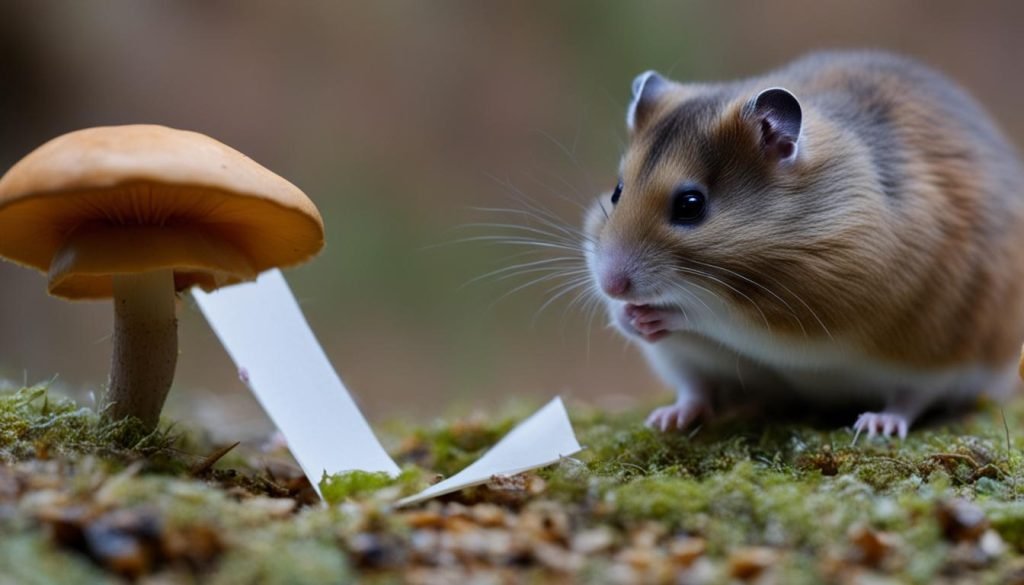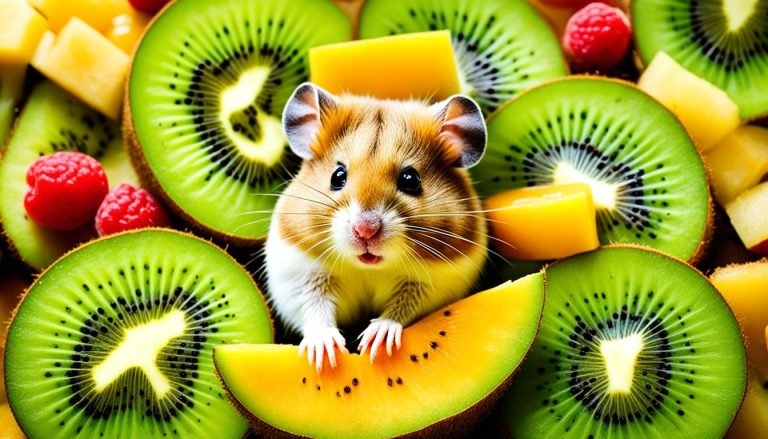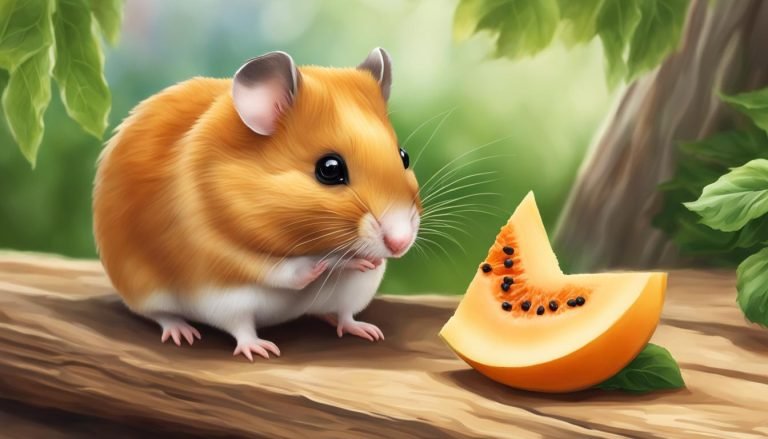Can Hamsters Eat Mushrooms? Safety Guide
As a hamster owner, I often wonder about what foods are safe to feed my furry friend. One question that frequently comes to mind is: can hamsters eat mushrooms?
The answer is not straightforward. While mushrooms are considered safe for human consumption, their effects on hamsters are not well-researched. Therefore, it is recommended to err on the side of caution and avoid adding mushrooms to your hamster’s diet.
Key Takeaways:
- Mushrooms for hamsters are not well-researched, so it’s safer to avoid them.
- Store-bought mushrooms, although non-toxic to humans, may pose unknown risks to hamsters.
- Hamsters can obtain all the necessary nutrients from their regular diet and other healthy treats.
- Certain mushrooms, especially raw ones, can contain harmful compounds and cause gastric upset and dental issues in hamsters.
- Opt for safer alternatives like fresh fruits and vegetables for your hamster’s nutritional needs.
Potential Benefits of Mushrooms

When it comes to human nutrition, mushrooms are often praised for their fiber, protein, vitamins, and minerals. Varieties such as portobello, button, shitake, chantarelle, and oyster mushrooms are known to offer a range of nutritional benefits to people. However, when it comes to hamsters, the potential benefits of mushrooms are not well-documented.
Mushrooms provide fiber, protein, iron, and other nutrients that can be beneficial for humans. However, hamsters have different dietary requirements and can obtain all the necessary nutrients from their regular diet and other healthy treats. As such, mushrooms are not essential for fulfilling their nutritional needs.
While mushrooms may offer nutritional benefits for humans, it is important to remember that hamsters have different digestive systems and nutritional requirements. Their small size and specific dietary needs make it crucial to focus on a well-balanced diet that prioritizes ingredients proven to support their health and well-being.
By providing your hamster with a diet composed of hamster-friendly foods, you can ensure they receive all the necessary nutrients without the potential risks that mushrooms may pose. Fresh fruits and vegetables, such as apples, bananas, broccoli, and Roman lettuce, are safe and recommended alternatives for treats in a hamster’s diet.
Ultimately, while mushrooms may have nutritional benefits for humans, they are not essential for hamsters and can be replaced with safer and more suitable options. By prioritizing your hamster’s health and meeting their specific dietary needs, you can ensure they live a happy and healthy life.
Potential Risks of Feeding Mushrooms to Hamsters
Feeding mushrooms to hamsters may pose potential risks and should be approached with caution. Certain mushrooms, especially when consumed in their raw form, contain trace amounts of potentially harmful or carcinogenic compounds. These compounds can have detrimental effects on the health of hamsters, leading to various issues such as gastric upset and dental problems.
The acidic nature of mushrooms can cause gastric upset in hamsters, leading to digestive discomfort and even diarrhea. Additionally, the compounds found in mushrooms may negatively affect the dental health of hamsters, potentially leading to dental issues.
When considering feeding mushrooms to your hamster, it is essential to avoid cooking them with oil, butter, or seasonings. These additional ingredients are not beneficial for your hamster’s digestive system and can worsen the potential risks associated with mushrooms.
To ensure the well-being of your hamster, it is advisable to prioritize their health by opting for safer food options that do not carry the risks associated with mushrooms. Some fruits and vegetables are safe and beneficial for hamsters. These can provide a well-balanced diet and minimize the chances of experiencing gastric upset or dental issues.
In conclusion, while mushrooms may be a commonly enjoyed food for humans, they pose potential risks when fed to hamsters. It is best to avoid feeding mushrooms to your pet hamster and focus on providing them with a diet that consists of recommended and hamster-friendly foods.
Lack of Research on Hamsters and Mushrooms
When it comes to the effects of mushrooms on hamsters, scientific research is quite limited. Most studies have focused on toxic mushrooms, leaving us with a scarcity of information on the specific impact of mushrooms on hamster health. As a result, it is important to approach feeding mushrooms to hamsters with caution and prioritize their well-being.
While mushrooms may be a common and safe food for humans, we cannot assume the same for our furry friends. Since there is a lack of scientific evidence supporting the safety of mushrooms for hamsters, it is recommended to err on the side of caution and avoid including mushrooms in their diet.
Without comprehensive research, it is difficult to determine how hamsters metabolize and react to different types of mushrooms. Therefore, it is advisable to focus on feeding foods that have been proven to be safe and beneficial for hamsters, rather than introducing potentially risky and untested ingredients.
Feeding mushrooms to hamsters carries certain uncertainties due to the lack of concrete scientific findings and studies. As pet owners, it is our responsibility to make informed decisions and prioritize the health and well-being of our little companions. While it may be tempting to offer mushrooms as a treat, it is best to explore safer alternatives to ensure the optimal nutritional intake for your hamster.
If you’re still curious about feeding mushrooms to your hamster, I recommend consulting a veterinarian who specializes in small animal care. They can provide personalized advice tailored to your hamster’s specific needs and offer guidance based on the latest scientific insights.
Although mushrooms may seem harmless, it is vital to prioritize your hamster’s health by adhering to recommended feeding practices until further scientific research is conducted on the effects of mushrooms specifically on hamsters.
Safer Alternatives to Mushrooms for Hamsters
Instead of feeding mushrooms to your hamster, there are many safer food options available. Fresh fruits and vegetables can be included in your hamster’s diet as treats, providing proven benefits and better suiting their nutritional needs.
Here are some hamster-friendly fruits and vegetables:
- Apples: A crunchy and nutritious fruit that hamsters enjoy.
- Bananas: A soft and sweet fruit that hamsters find delicious.
- Broccoli: A vitamin-packed vegetable that adds variety to their diet.
- Romaine Lettuce: A hydrating and low-calorie option for your hamster.
These alternatives not only offer a range of flavors for your hamster to explore but also provide essential nutrients such as fiber, vitamins, and minerals. Remember to introduce these treats gradually and in moderation. Monitoring your hamster’s reaction to new foods is crucial to ensure their digestive system tolerates them well.
Adding variety to your hamster’s diet through safe alternatives like fresh fruits and vegetables ensures they receive a balanced and nutritious meal plan. These options are a fantastic way to enhance your hamster’s dining experience and keep them healthy and happy.
Summary and Recommendations
In conclusion, it is important to consider the safety and potential risks when determining whether hamsters should eat mushrooms. Due to the lack of research on hamsters and mushrooms, it is recommended to err on the side of caution and avoid feeding mushrooms to your hamster. While small amounts of store-bought mushrooms may not cause harm, it is advisable to prioritize a well-balanced diet for your hamster using recommended foods.
If you want to treat your hamster occasionally, there are safer alternatives to mushrooms that provide proven benefits. Fresh fruits and vegetables, such as apple slices and broccoli florets, can be given as occasional treats to satisfy your hamster’s cravings without compromising their health. These alternatives offer a variety of nutrients and are better suited to meet your hamster’s nutritional needs.
If you have any concerns about mushrooms or notice any changes in your hamster’s behavior after consuming mushrooms, it is always best to consult with a veterinarian. They can provide further guidance and ensure the well-being of your furry friend.
Final Thoughts
After considering the available information and potential risks, it is advisable to avoid feeding mushrooms to your hamster. The lack of scientific research on hamsters and mushrooms, combined with the potential harm from toxic compounds, outweighs any potential benefits they may have. As a responsible hamster owner, it is crucial to prioritize your furry friend’s health and well-being.
Instead of mushrooms, focus on providing a balanced diet for your hamster by offering safe and proven alternatives. Fresh fruits and vegetables like apples, bananas, broccoli, and Roman lettuce can serve as nutritious treats. These options not only meet your hamster’s dietary needs but also reduce the risk of potential health issues associated with mushrooms.
If you have any concerns about your hamster’s diet or notice any changes in their behavior, it is always recommended to consult with a veterinarian. They can provide personalized advice and guidance based on your hamster’s specific needs. By making informed choices and prioritizing your hamster’s health, you can ensure a happy and thriving furry companion.
Similar Posts:
- Can Hamsters Eat Mealworms? Safe Snack Guide
- Can Hamsters Eat Crackers? Safe Snack Tips.
- Can Hamsters Eat Asparagus? Safe Feeding Guide
- Can Hamsters Eat Peaches? Safe Snacking Tips
- Can Hamsters Eat Cilantro? Safe Herb Guide
- Can Hamsters Eat Cantaloupe? Find Out
- Can Hamsters Eat Avocado? Diet Safety Tips
- Can Hamsters Eat Pineapple? Safe Snack Guide
- Can Hamsters Eat Green Beans? A Complete Guide
- Can Hamsters Eat Blackberries? Safe Treat Tips
- Can Hamsters Eat Popcorn? Safe Snack Tips
- Can Hamsters Eat Salami? Here’s Why Vets Say No







